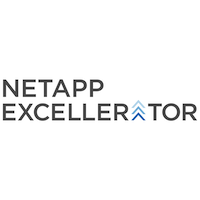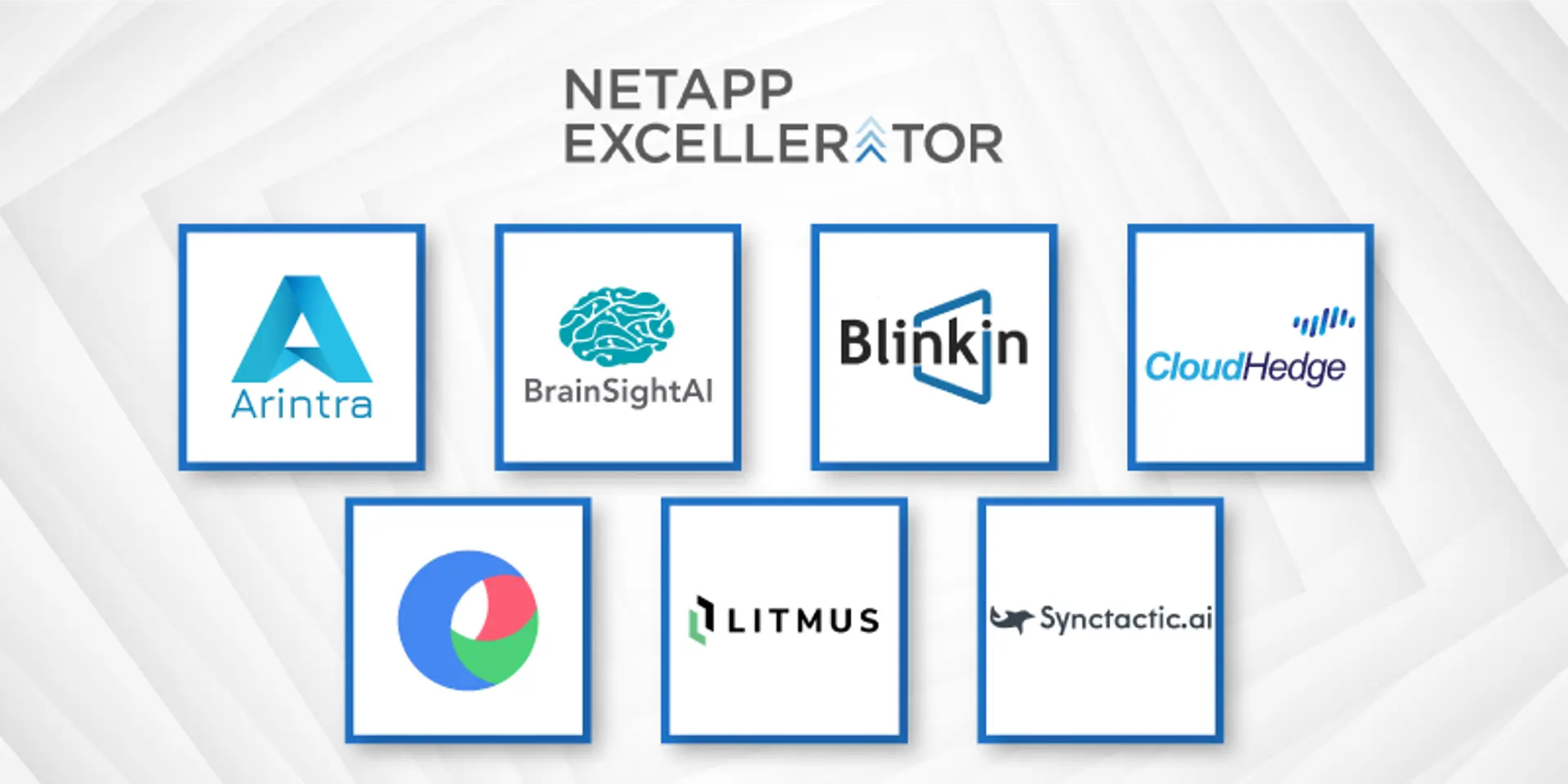
NetApp Excellerator
View Brand PublisherFrom addressing mental health challenges to industrial IoT adoption, meet the 7 startups of NetApp Excellerator cohort 7 who are driving data-driven disruption
Since its inception in 2017, the NetApp Excellerator has become a key enabler for B2B startups in the areas of cloud, IoT, big data, and analytics, machine learning, virtualization, data security, data management, storage, and allied areas, looking to accelerate their journeys. Today, of the 35 startups which have graduated from the programme through six successive cohorts, more than 70 percent have successfully raised follow-on funding. With its fifth cohort in 2019, the programme opened up the opportunity for PoCs with NetApp. This resulted in nine impactful PoCs that enabled the startups to sharpen their offerings and also tap into bigger business opportunities. With a global reach, NetApp’s global startup program, NetApp Excellerator has been instrumental in fueling innovation in the DeepTech startup domain and further accelerating the growth and adoption of cutting-edge technologies.
“Today, more than ever before, businesses and organisations are witnessing the need to leverage cloud and data technologies as well as IoT, AI and ML, to develop long-term resilience to economic and societal changes and respond quickly to any sudden developments. To put it simply, today enterprises, governments and startups, understand the tremendous impact data-driven insights can bring,” shared Madhurima Agarwal, leader, NetApp Excellerator.
Earlier in July, NetApp announced the launch of NetApp ExcellerateHER - an accelerator programme for women entrepreneurs. It was announced that ExcellerateHER would run in parallel with the 7th cohort of NetApp Excellerator. And, of the seven startups part of cohort 7, two startups -- Brainsight and Arintra -- are part of ExcellerateHER. “We are excited about the start of yet another journey to create impact and showcase how diversity can propel the growth of deep tech in new directions.”
The cohort 7 will be the second cohort of NetApp Excellerator which is being executed virtually. While the four-month long business and technical mentorship programme is underway, here are more details of the seven startups that made it to cohort 7
Sn126
‘Software testing is hard. It takes 2.5 times the effort to write good tests than it does to write the code that needs to be tested. This prohibitive cost results in most software having poor coverage and software bugs constantly leaking into production,” shares Puneet Khanduri, Co-Founder and CEO, Sn126. He teamed up with his brother, Prashant Khanduri, to build Sn126 - a platform that eliminates the need for humans to write tests by automatically learning test scenarios by observing the behaviors of existing software versions deployed in production. The 2018-founded startup counts some of the biggest names in the industry as its clients, which includes companies like Twitter, Airbnb, Mixpanel, and Robinhood. The co-founders believe that the adoption of microservices and the growing aspiration to increase shipping velocity has significantly increased the risk of things breaking in production. “This creates a need for intelligent tools like ours that leverage machines to tackle problems that have scaled beyond the limits of manual human effort.”
SynctacticAI
is a centralised data platform that is working towards democratising the use of data science, machine learning, and AI. Founded by Chethan K R and Ashish Koushik, the startup aims to empower citizen data scientists to contribute towards a company’s growth and build an overall data-driven culture powered through their platform. Founded in 2019, the startup counts Reckitt Benkiser, Grant Thornton LLP, Sports Mechanics, Conosh, Cube Monk among its key clients. Chethan, the Co-Founder, says, with SynctacticAI, organisations can obtain and deploy AI models in days, without relying on data scientists in the process. “SynctacticAI does not require any data preparation, engineering or prepossessing - it connects directly to raw data, and uses neural networks to automate the entire predictive process,” adds Chethan.
Litmus
Today several companies deploying an IoT solution are stuck in “pilot purgatory” for up to two years. Pilot purgatory happens primarily for one of the following reasons: deployment is slow and expensive, factory systems and data are complex, and/or the project lacks clear ROI. Founded in 2014 by Vatsal Shah, John Younes and Sacha Sawaya, Litmus solves all of these challenges. With more than 250 pre-built drivers, Litmus Edge connects to every data source to provide a complete data picture for Industry 4.0 use cases ranging from Smart Manufacturing to Industrial IoT and Machine Learning. From device health monitoring, to device deployment and configuration, to data and marketplace application orchestration – Litmus Edge Manager reduces device lifecycle management complexity. Today, Litmus powers IoT initiatives of a number of Fortune 500 companies including Nissan, Renault and Mitsubishi.
Arintra
Physician-burnout is a fundamental problem in US healthcare costing the healthcare industry $4.6 billion annually. "Physicians are spending nearly 50 percent of their day on administrative and documentation tasks rather than on patient care." explains Nitesh Shroff, CEO and co-founder of US-based . Teaming up in 2019 with Preeti Bhargava, fellow PhD from University of Maryland, the two designed Arintra, an AI-based ready-to-integrate solution that enables clinical and automated patient intake, faster chart review, and automated billable EMR notes. "Arintra's medical AI increases the efficiency of medical consultations by: i) Asking medically relevant questions during patient intake, ii) Generates a summarized patient chart taking his/her medical history from across the EHRs and from today's intake questions. iii) Generates automated EMR notes pre-populated with right billable codes. In effect, Arintra saves upto three hours everyday for the physicians. Arintra is integrated with several prominent EHRs and also has very robust medical APIs that can be used by other health-tech companies," explains Preeti.
Blinkin Technologies
Founded in 2019 by a team of serial entrepreneurs and deep-domain experts, Harshwardhan Kumar, Dhiraj Choudhary, and Josef Süß, is empowering support engineers to deliver exceptional tech support anywhere, everytime. BlinkIn is an omni-channel platform, where users can chat, talk, and video call without having to download an app download or register on any platform. It also supports frictionless switching between live, synchronous and asynchronous channels. “BlinkIn will revolutionise the customer support domain by providing the first intelligent visual support solution powered by artificial intelligence and augmented reality,” says Dhiraj, the Co-founder and COO. He adds, “What makes BlinkIn different is that BlinkIn’s visual bots help to analyse a problem, guide people using AI and AR capabilities through the problem resolution, and visually validate and document the undertaken actions.” Blinkin is being leveraged by companies such as L&T Defence, Tata Steel and Wilo, with several other companies such as Skanray, and Huber & Ranner running pilots.
BrainSightAI
Founded by Dr Rimjhim Agrawal, a Ph.D holder in machine learning, neuroimaging, and psychiatry and one of the few people globally with expertise in the three key areas, and Laina Emmanuel, an industry expert in healthcare management, policy, and consulting, is bringing artificial intelligence to neuroscience to enable greater precision in neurological and psychiatric investigation for accelerated patient outcomes.
The startup currently provides two AI-based solutions -Voxelbox and Snowdrop. Voxelbox provides clinicians with access to a world-class resting-state fMRI processing engine and machine-learning models for generating reports to aid clinical decision making. Snowdrop is a patient care app that enables compliance with treatment schedule and builds a holistic patient profile between visits with reports triangulated from patients, caregivers, and their AI engine. “Today at BrainSightAI we are working towards addressing one of the most fundamental problems in mental health – how does one form a complete picture of a mental health issue, including both the psychosocial and the neurobiological aspects,” shares Laina.
CloudHedge Technologies
While working on enterprise applications and their deployment on cloud, Abhijit Joshi, Sameer Karmarkar and Ameya Varade realised a lot of processes can be automated. “We also realised that there is a bigger challenge for enterprises. Over 80 percent of apps were still in data centers and business owners were looking to reduce their TCO while wanting them to be agile and scalable. Incidentally, that is when Docker and Kubernetes were portrayed as the future,” shares Abhijit, who is the co-founder and CEO of CloudHedge. The team then came together to start CloudHedge in 2018. “CloudHedge is the first and the only tool in the list of second-gen migration or modernisation set of tools. It enables enterprises to skip the lift and shift approach to cloud and directly modernize the apps through its patented and automated tools - Discover™, Transform™, and Cruize™,” explains Abhijit. CloudHedge’s tools discover and analyse applications for cloud readiness, and provide actionable insights and recommendations for CXOs and practitioners, thus making the journey highly predictable and efficient. Using machine learning, CloudHedge automates the applications assessment, transformation, and deployment on k8s within hours and days instead of months.”
A B2B accelerator programme with access to domain experts and business opportunities
The seven startups are excited about their induction into NetApp’s global startup programme.
Sn126’s Puneet Khanduri shares, “The programme is unique in how it provides individual attention to small cohorts. In addition to providing access to NetApp’s technical expertise, the programme opens up customer access by leveraging NetApp's existing enterprise sales ecosystem. As a startup, lead generation and go-to-market are really hard problems to solve and partners like NetApp Excellerator can help make this part of the journey easier.” A thought that is shared by Litmus’ John Younes and Arintra’s Nitesh Shroff who say, “NetApp Excellerator is the only accelerator programme that is designed to help B2B startups with joint GTM, fine tuning their sales strategy and helping with customer and industry connections.”
For others, the domain expertise of NetApp is unmatched. Chethan from SynctacticAI says, “The NetApp Excellerator has a unique structure which focuses on the needs of data startups. We believe that it is very important to work with a company that understands the domain you are in. And, we couldn’t have found anyone else better than NetApp.” Having worked with NetApp in 2007, BrainSightAI’s Laina Emmanuel shares, “I understand the in-depth technical knowledge that the team here has. I think one of the prime reasons we applied to Netapp Excellerator was to be able to interact with highly-skilled engineers who can help us get high-performance computing to hospitals.” Early this year in July, NetApp also announced the launch of NetApp ExcellerateHER, an exclusive accelerator programme for women-founded startups where the selections would be made based on the common applications that the programme received. And, BriansightAI is among the first startups to be selected. Laina says , “I haven’t had the chance to interact with many women tech-founders. I have interacted with a lot of them in senior positions in established companies. But I think as startup founders, you are quite isolated from each other. I am super excited about being able to be a part of this programme, and learn from other women mentors.”







